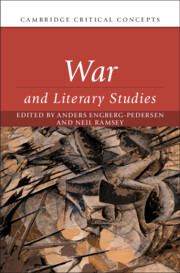Book contents
- War and Literary Studies
- Cambridge Critical Concepts
- War and Literary Studies
- Copyright page
- Contents
- Figures
- Contributors
- Acknowledgments
- Introduction: War, Literature, and the History of Knowledge
- Part I Origins and Theories
- Chapter 1 War and Ancient Athens
- Chapter 2 War and Chinese Culture
- Chapter 3 War and Romantic Thought
- Chapter 4 War and Critical Theory
- Chapter 5 War and French Theory
- Chapter 6 War and Media Studies
- Chapter 7 War and Postcolonial Studies
- Part II Foundational Concepts
- Part III Emerging Concepts
- Index
Chapter 5 - War and French Theory
from Part I - Origins and Theories
Published online by Cambridge University Press: 15 January 2023
- War and Literary Studies
- Cambridge Critical Concepts
- War and Literary Studies
- Copyright page
- Contents
- Figures
- Contributors
- Acknowledgments
- Introduction: War, Literature, and the History of Knowledge
- Part I Origins and Theories
- Chapter 1 War and Ancient Athens
- Chapter 2 War and Chinese Culture
- Chapter 3 War and Romantic Thought
- Chapter 4 War and Critical Theory
- Chapter 5 War and French Theory
- Chapter 6 War and Media Studies
- Chapter 7 War and Postcolonial Studies
- Part II Foundational Concepts
- Part III Emerging Concepts
- Index
Summary
War features prominently in the broader formation of thought commonly referred to as French Theory. Particularly in the late 1970s and 1980s war attracted the attention of a number of the leading thinkers in France. In 1976 Michel Foucault offered his lecture course at the Collège de France, Il faut défendre la société; in the same year Raymond Aron published his large tome Penser la guerre: Clausewitz; in 1980 Gilles Deleuze and Felix Guattari developed their theory of nomadology and the war machine in Milles plateaux; and in 1987 Guy Debord and Alice Becker-Ho published their wargame Le Jeu de la guerre, originally invented in 1965. This chapter examines the key role that war comes to play in French Theory from the 1970s onward. It traces the flux of historical concepts from early-nineteenth-century Prussian military thought into high theory in France and their transformation from military concepts into metaphors and figures of thought. It thereby offers an overview of the of the productive impact of war on French Theory, but also critically stakes out the limits of the militarization of thinking.
- Type
- Chapter
- Information
- War and Literary Studies , pp. 85 - 101Publisher: Cambridge University PressPrint publication year: 2023



